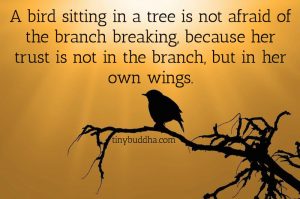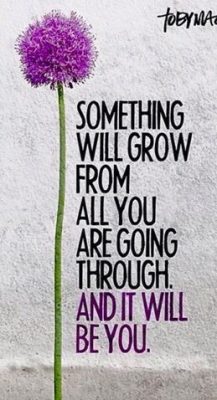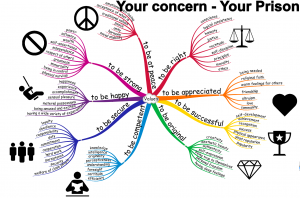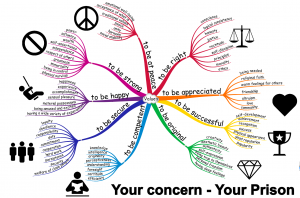Back in 1988 I had an emotional meltdown. I suddenly remembered things from my childhood.
I was suggested by someone in Landmark Education that it would be beneficial for me to join an ACOA group. Adult Children of Alcoholics and Dysfunctional Families.
I did. I had clear signals that I belonged. #1 of the identifying features of ACOA people is “I don’t know who I am”. 2
Anyway, an ACOA group is not a fun place.
It is a group, normally, of people who are stuck. Why? My guess is because the context never changes to anything other than what it is: I am a victim.
During the first meeting I was asked to choose what it is that I was going to honor as “higher power”, because all 12-step programs were religious… I am an atheist.
I, without thinking, said “Whatever works” that is what my higher power is.
It didn’t even make sense to me. Others’ higher power was god, or the universe, or the truth… but my ethnic culture is Judaism, and in Judaism you are supposed to question everything, debate everything, from the moment you can talk.
 In a Jewish house of worship, the Beit Knesset, synagogue, you say, you argue as much as in the Knesset, which is the same as your house of representatives.
In a Jewish house of worship, the Beit Knesset, synagogue, you say, you argue as much as in the Knesset, which is the same as your house of representatives.
The truth will set you free… but I’d say that arguing the truth is the process you get to YOUR truth.
My truth was: I honor whatever works.
Today I had a glimpse of what I meant then: I will follow the experimentation route of my ancestors. It worked for them, and it will work for me.
I will test and observe. I will consider life an experiment, and choose the next experiment based on what I saw in the previous one. The only failed experiment is an experiment that ran too long.
There is an art to experimentation, and I’ll master that. The art.
It is also a context for life… a frame through which I can thrive.
I throw stuff on the wall, see what sticks, what comes back. The echo.
Here is another way to view the frame: I want feedback. No feedback means I am dead. Feedback informs. Even noise. Even expletives people throw at me. Resistance is a feedback. Feedback is like a sonar. Or a radar… You know where you are, what’s out there, you know your direction, and you know how to alter it.
Buckminster Fuller could be considered an honorary Jew.
So, what does this mean to you?
 All truth is momentary, temporary, and the result of an experiment. The next truth will come with the next experiment.
All truth is momentary, temporary, and the result of an experiment. The next truth will come with the next experiment.
Certain Soul Corrections are angry, argumentative, or skittish because they consider truth fixed.
Certain ethnicities are that same way: the truth is fixed.
But soul correction is not truth either. It is a tendency.
I have a student whose soul correction would predicate him to be a failure, but he is willing to experiment, and he is winning.
Is there such a thing as a winner? No! There is winning today. It says nothing about tomorrow.
You can live your life awake, aware, or asleep, hoping.
Any religion, any worldview, any cult, any teaching that deals in truth is a death trap.
Shake it off, or put it in a context that allows it to be isolated.
 Because whatever you consider truth will make you rigid… and rigid should remind you to rigor mortem… The stiffening of the body when you die.
Because whatever you consider truth will make you rigid… and rigid should remind you to rigor mortem… The stiffening of the body when you die.
PS: I have a large number of websites I manage. Today the software of all my sites had to be updated. Normally a 2-3 hour task, mind numbing.
But not if you do it as an experiment. And I am an experimenter, remember?
So I started out with observing myself. I did not create an experiment without first looking at what is… A is A… and that is the starting point.
I found that the system I have works. It allows me to never stop, never ponder, never having to double-check. So I decided to not alter anything, consider doing the whole task as testing if it still works, all two hours of it.
This is another example of “whatever works”… don’t change things just to change them.
- Higher Power is a term coined in the 1930s in Alcoholics Anonymous (AA) and is used in other twelve-step programs. It is also sometimes referred to as a power greater than ourselves and is frequently abbreviated to HP. The term sometimes refers to a supreme being or deity, or some conception of God. Wikipedia
Finding Your Higher Power in Recovery- Getting Over Your Doubts. … Twelve step programs should encourage you to find your own conception of a higher power. For some this connection with a greater power can easily be present, because they come into recovery with a pre established faith or belief.
- I pulled up the list and it wasn’t on it. But I saw myself belonging because of the “I don’t know who I am” and it worked. For me.
The Laundry List – 14 Traits of an Adult Child of an Alcoholic
- We became isolated and afraid of people and authority figures.
- We became approval seekers and lost our identity in the process.
- We are frightened by angry people and any personal criticism.
- We either become alcoholics, marry them or both, or find another compulsive personality such as a workaholic to fulfill our sick abandonment needs.
- We live life from the viewpoint of victims and we are attracted by that weakness in our love and friendship relationships.
- We have an overdeveloped sense of responsibility and it is easier for us to be concerned with others rather than ourselves; this enables us not to look too closely at our own faults, etc.
- We get guilt feelings when we stand up for ourselves instead of giving in to others.
- We became addicted to excitement.
- We confuse love and pity and tend to “love” people we can “pity” and “rescue.”
- We have “stuffed” our feelings from our traumatic childhoods and have lost the ability to feel or express our feelings because it hurts so much (Denial).
- We judge ourselves harshly and have a very low sense of self-esteem.
- We are dependent personalities who are terrified of abandonment and will do anything to hold on to a relationship in order not to experience painful abandonment feelings, which we received from living with sick people who were never there emotionally for us.
- Alcoholism is a family disease; and we became para-alcoholics and took on the characteristics of that disease even though we did not pick up the drink.
- Para-alcoholics are reactors rather than actors.
Tony A., 1978
Note: The Laundry List serves as the basis for The Problem statement.
The Flip Side of The Laundry List
- We move out of isolation and are not unrealistically afraid of other people, even authority
figures.
- We do not depend on others to tell us who we are.
- We are not automatically frightened by angry people and no longer regard personal criticism as a threat.
- We do not have a compulsive need to recreate abandonment.
- We stop living life from the standpoint of victims and are not attracted by this trait in our important relationships.
- We do not use enabling as a way to avoid looking at our own shortcomings.
- We do not feel guilty when we stand up for ourselves.
- We avoid emotional intoxication and choose workable relationships instead of constant
upset.
- We are able to distinguish love from pity, and do not think “rescuing” people we “pity” is an act of love.
- We come out of denial about our traumatic childhoods and regain the ability to feel and express our emotions.
- We stop judging and condemning ourselves and discover a sense of self-worth.
- We grow in independence and are no longer terrified of abandonment. We have interdependent relationships with healthy people, not dependent relationships with people who are emotionally unavailable.
- The characteristics of alcoholism and para-alcoholism we have internalized are identified, acknowledged, and removed.
- We are actors, not reactors.
- To cover our fear of people and our dread of isolation we tragically become the very authority figures who frighten others and cause them to withdraw.
- To avoid becoming enmeshed and entangled with other people and losing ourselves in the process, we become rigidly self-sufficient. We disdain the approval of others.
- We frighten people with our anger and threat of belittling criticism.
- We dominate others and abandon them before they can abandon us or we avoid relationships with dependent people altogether. To avoid being hurt, we isolate and dissociate and thereby abandon ourselves.
- We live life from the standpoint of a victimizer, and are attracted to people we can manipulate and control in our important relationships.
- We are irresponsible and self-centered. Our inflated sense of self-worth and self-importance prevents us from seeing our deficiencies and shortcomings.
- We make others feel guilty when they attempt to assert themselves.
- We inhibit our fear by staying deadened and numb.
- We hate people who “play” the victim and beg to be rescued.
- We deny that we’ve been hurt and are suppressing our emotions by the dramatic expression of “pseudo” feelings.
- To protect ourselves from self punishment for failing to “save” the family we project our self-hate onto others and punish them instead.
- We “manage” the massive amount of deprivation we feel, coming from abandonment within the home, by quickly letting go of relationships that threaten our “independence” (not too close).
- We refuse to admit we’ve been affected by family dysfunction or that there was dysfunction in the home or that we have internalized any of the family’s destructive attitudes and behaviors.
- We act as if we are nothing like the dependent people who raised us.
The Flip Side of The Other Laundry List
- We face and resolve our fear of people and our dread of isolation and stop intimidating others with our power and position.
- We realize the sanctuary we have built to protect the frightened and injured child within has become a prison and we become willing to risk moving out of isolation.
- With our renewed sense of self-worth and self-esteem we realize it is no longer necessary to protect ourselves by intimidating others with contempt, ridicule and anger.
- We accept and comfort the isolated and hurt inner child we have abandoned and disavowed and thereby end the need to act out our fears of enmeshment and abandonment with other people.
- Because we are whole and complete we no longer try to control others through manipulation and force and bind them to us with fear in order to avoid feeling isolated and alone.
- Through our in-depth inventory we discover our true identity as capable, worthwhile people. By asking to have our shortcomings removed we are freed from the burden of inferiority and grandiosity.
- We support and encourage others in their efforts to be assertive.
- We uncover, acknowledge and express our childhood fears and withdraw from emotional intoxication.
- We have compassion for anyone who is trapped in the “drama triangle” and is desperately searching for a way out of insanity.
- We accept we were traumatized in childhood and lost the ability to feel. Using the 12 Steps as a program of recovery we regain the ability to feel and remember and become whole human beings who are happy, joyous and free.
- In accepting we were powerless as children to “save” our family we are able to release our self-hate and to stop punishing ourselves and others for not being enough.
- By accepting and reuniting with the inner child we are no longer threatened by intimacy, by the fear of being engulfed or made invisible.
- By acknowledging the reality of family dysfunction we no longer have to act as if nothing were wrong or keep denying that we are still unconsciously reacting to childhood harm and injury.
- We stop denying and do something about our post-traumatic dependency on substances, people, places and things to distort and avoid reality.


Yes, Nev. Being able to see that everything changes all the time, and be able to dance with me would save you a lot of grief. Because there is safety in dancing, just a self-trust kind of safety, that is flexible.
I don’t know if this is a good time for you to experiment and learn to dance, but if it is, please do try and learn the moves. xoxo
“they consider truth fixed.”
Perhaps the most important line for me personally. I see how the past few weeks have been so difficult for me because of this. I suddenly see that I need there to be only one truth or one way of doing things because it gives me certainty and surety. But truth cannot be fixed – and this is what is causing friction within me. So I have been straining to get to a singular truth so that I can get comfortable…only to experience (because I could not see and discern at the time) the exact opposite at every turn!
What a rude awakening! But nonetheless…another piece of the puzzle…